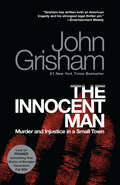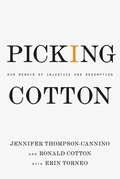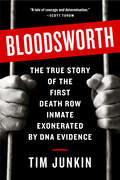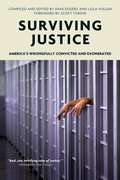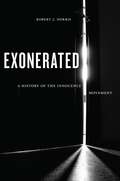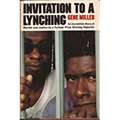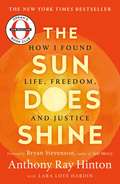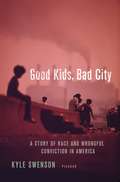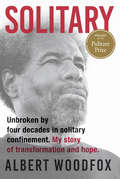Special Collections
Wrongful Convictions
Description: A collection of books that detail some of the greatest miscarriages of justice in the American legal system (that we know about). #adults
- Table View
- List View
The Innocent Man
by John Grisham#1 NEW YORK TIMES BESTSELLER • LOOK FOR THE NETFLIX ORIGINAL DOCUMENTARY SERIES • &“Both an American tragedy and [Grisham&’s] strongest legal thriller yet, all the more gripping because it happens to be true.&”—Entertainment Weekly John Grisham&’s first work of nonfiction: a true crime masterpiece that tells the story of small town justice gone terribly awry. In the Major League draft of 1971, the first player chosen from the state of Oklahoma was Ron Williamson. When he signed with the Oakland A&’s, he said goodbye to his hometown of Ada and left to pursue his dreams of big league glory. Six years later he was back, his dreams broken by a bad arm and bad habits. He began to show signs of mental illness. Unable to keep a job, he moved in with his mother and slept twenty hours a day on her sofa. In 1982, a twenty-one-year-old cocktail waitress in Ada named Debra Sue Carter was raped and murdered, and for five years the police could not solve the crime. For reasons that were never clear, they suspected Ron Williamson and his friend Dennis Fritz. The two were finally arrested in 1987 and charged with capital murder. With no physical evidence, the prosecution&’s case was built on junk science and the testimony of jailhouse snitches and convicts. Dennis Fritz was found guilty and given a life sentence. Ron Williamson was sent to death row. If you believe that in America you are innocent until proven guilty, this book will shock you. If you believe in the death penalty, this book will disturb you. If you believe the criminal justice system is fair, this book will infuriate you.Don&’t miss Framed, John Grisham&’s first work of nonfiction since The Innocent Man, co-authored with Centurion Ministries founder Jim McCloskey.
Picking Cotton
by Erin Torneo and Jennifer Thompson-Cannino and Ronald CottonJennifer and Ronald unfold the harrowing details of their tragedy, and challenge our ideas of memory and judgement while demonstrating the profound nature of human grace and the healing power of forgiveness.
Bloodsworth
by Tim JunkinFans of Serial and Making a Murderer, meet Kirk Bloodsworth, the first death row inmate exonerated by DNA evidence.
Charged with the rape and murder of a nine-year-old girl in 1984, Bloodsworth was tried, convicted, and sentenced to die in Maryland's gas chamber. From the beginning, he proclaimed his innocence, but when he was granted a new trial because his prosecutors improperly withheld evidence, the second trial also resulted in conviction.
Bloodsworth read every book on criminal law in the prison library and persuaded a new lawyer to petition for the then-innovative DNA testing. After nine years in one of the harshest prisons in America, Bloodsworth was vindicated by DNA evidence. Intense and hard-hitting, Bloodsworth is the story of a man’s tireless fight against a justice system that failed him.
Surviving Justice
by Dave Eggers and Scott Turow and Lola VollenSurviving Justice presents oral histories of thirteen people from all walks of life, who, through a combination of all-too-common factors—overzealous prosecutors, inept defense lawyers, coercive interrogation tactics, eyewitness misidentification— found themselves imprisoned for crimes that they did not commit.
The stories these exonerated men and women tell are spellbinding, heartbreaking, and ultimately inspiring. These narrators include: Paul Terry, who spent twenty-seven years wrongfully imprisoned, and emerged psychologically devastated and barely able to communicate.
Beverly Monroe, an organic chemist who was coerced into falsely confessing to the murder of her lover. Free after seven years, she faces the daunting task of rebuilding her life from the ground up. Joseph Amrine, who was sentenced to death for murder.
Seventeen years later, when DNA evidence exonerated him, Amrine emerged from prison with nothing but the fourteen dollars in his inmate account.
Exonerated
by Robert J. NorrisThe fascinating story behind the innocence movement's quest for justice.Documentaries like Making a Murderer, the first season of Serial, and the cause célèbre that was the West Memphis Three captured the attention of millions and focused the national discussion on wrongful convictions. This interest is warranted: more than 1,800 people have been set free in recent decades after being convicted of crimes they did not commit. In response to these exonerations, federal and state governments have passed laws to prevent such injustices; lawyers and police have changed their practices; and advocacy organizations have multiplied across the country. Together, these activities are often referred to as the “innocence movement.” Exonerated provides the first in-depth look at the history of this movement through interviews with key leaders such as Barry Scheck and Rob Warden as well as archival and field research into the major cases that brought awareness to wrongful convictions in the United States. Robert Norris also examines how and why the innocence movement took hold. He argues that while the innocence movement did not begin as an organized campaign, scientific, legal, and cultural developments led to a widespread understanding that new technology and renewed investigative diligence could both catch the guilty and free the innocent. Exonerated reveals the rich background story to this complex movement.
Invitation To A Lynching
by Gene MillerA Pulitzer Prize-winning journalist tells the story of two black men, Wilbert Lee and Fred Pitts, apparently framed for the 1963 robbery-murder of two white gas station attendants in Florida. The case has become a model of Southern small-town justice, with the two suspects tried, sentenced and expedited to death row within 30 days of their arrest.
The evidence against them was based on an extorted confession and the testimony of intimidated witnesses. A court-appointed lawyer told them to plead guilty, and a sleazy lie-detector expert.
Three years later a white convict confessed to the crime and his statement was corroborated by his mistress. Yet Lee and Pitts were not released, the Florida courts would not give the white man, Curits Adams (he was already serving a life prison sentence) immunity for an admission that could have sent him to the electric chair.
Despite the work of conscientious Miami Herald reporters, attorneys, and some officials in the state Attorney General's office, Pitts and Lee are in jail today, their sentence commuted to life imprisonment.
The Sun Does Shine
by Bryan Stevenson and Anthony Ray Hinton and Lara Love HardinA powerful, revealing story of hope, love, justice, and the power of reading by a man who spent thirty years on death row for a crime he didn't commit.
"An amazing and heartwarming story, it restores our faith in the inherent goodness of humanity.”- Archbishop Desmond Tutu
In 1985, Anthony Ray Hinton was arrested and charged with two counts of capital murder in Alabama. Stunned, confused, and only twenty-nine years old, Hinton knew that it was a case of mistaken identity and believed that the truth would prove his innocence and ultimately set him free.
But with no money and a different system of justice for a poor black man in the South, Hinton was sentenced to death by electrocution.
He spent his first three years on Death Row at Holman State Prison in agonizing silence—full of despair and anger toward all those who had sent an innocent man to his death. But as Hinton realized and accepted his fate, he resolved not only to survive, but find a way to live on Death Row.
For the next twenty-seven years he was a beacon—transforming not only his own spirit, but those of his fellow inmates, fifty-four of whom were executed mere feet from his cell. With the help of civil rights attorney and bestselling author of Just Mercy, Bryan Stevenson, Hinton won his release in 2015.
With a foreword by Stevenson, The Sun Does Shine is an extraordinary testament to the power of hope sustained through the darkest times.
Destined to be a classic memoir of wrongful imprisonment and freedom won, Hinton’s memoir tells his dramatic thirty-year journey and shows how you can take away a man’s freedom, but you can’t take away his imagination, humor, or joy.
Oprah's Book Club Summer 2018 Selection
A New York Times Bestseller
Good Kids, Bad City
by Kyle SwensonFrom award-winning investigative journalist Kyle Swenson, Good Kids, Bad City is the true story of the longest wrongful imprisonment in the United States to end in exoneration, and a critical social and political history of Cleveland, the city that convicted them.
In the early 1970s, three African-American men—Wiley Bridgeman, Kwame Ajamu, and Rickey Jackson—were accused and convicted of the brutal robbery and murder of a man outside of a convenience store in Cleveland, Ohio.
The prosecution’s case, which resulted in a combined 106 years in prison for the three men, rested on the more-than-questionable testimony of a pre-teen, Ed Vernon.
The actual murderer was never found.
Almost four decades later, Vernon recanted his testimony, and Wiley, Kwame, and Rickey were released. But while their exoneration may have ended one of American history’s most disgraceful miscarriages of justice, the corruption and decay of the city responsible for their imprisonment remain on trial.
Interweaving the dramatic details of the case with Cleveland’s history—one that, to this day, is fraught with systemic discrimination and racial tension—Swenson reveals how this outrage occurred and why.
Good Kids, Bad City is a work of astonishing empathy and insight: an immersive exploration of race in America, the struggling Midwest, and how lost lives can be recovered.
Solitary
by Albert WoodfoxSolitary is the unforgettable life story of a man who served more than four decades in solitary confinement―in a 6-foot by 9-foot cell, 23 hours a day, in notorious Angola prison in Louisiana―all for a crime he did not commit.
That Albert Woodfox survived was, in itself, a feat of extraordinary endurance against the violence and deprivation he faced daily. That he was able to emerge whole from his odyssey within America’s prison and judicial systems is a triumph of the human spirit, and makes his book a clarion call to reform the inhumanity of solitary confinement in the U.S. and around the world.
Arrested often as a teenager in New Orleans, inspired behind bars in his early twenties to join the Black Panther Party because of its social commitment and code of living, Albert was serving a 50-year sentence in Angola for armed robbery when on April 17, 1972, a white guard was killed. Albert and another member of the Panthers were accused of the crime and immediately put in solitary confinement by the warden.
Without a shred of actual evidence against them, their trial was a sham of justice that gave them life sentences in solitary. Decades passed before Albert gained a lawyer of consequence; even so, sixteen more years and multiple appeals were needed before he was finally released in February 2016.
Remarkably self-aware that anger or bitterness would have destroyed him in solitary confinement, sustained by the shared solidarity of two fellow Panthers, Albert turned his anger into activism and resistance.
The Angola 3, as they became known, resolved never to be broken by the grinding inhumanity and corruption that effectively held them for decades as political prisoners. He survived to give us Solitary, a chronicle of rare power and humanity that proves the better spirits of our nature can thrive against any odds.
